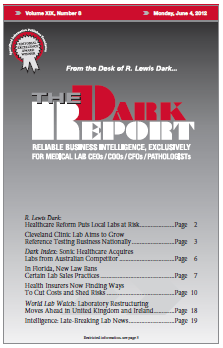CEO SUMMARY: Florida law has long prohibited clinical laboratories from giving kickbacks and other forms of remuneration to physicians to induce specimen referrals. Specifically, state regulations have prevented labs from placing specimen collectors in physicians’ offices. Despite these clear prohibitions, labs regularly violated state rules by placing specimen collectors and other lab employees in physicians’ …
In Florida, New Law Bans Certain Lab Sales Practices Read More »
To access this post, you must purchase The Dark Report.


